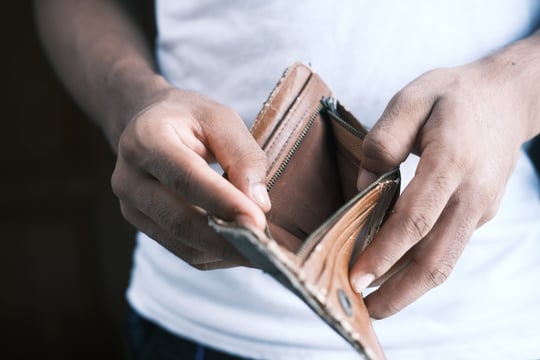Emergency fund: Why and How you should start
Emergency fund: Why and How you should start
We’ve all heard the expression “saving for a rainy day”. This saying suggests a future time of need that may never come. But the reality is nobody can predict the future (for example… Covid?!) and by having no extra funds to pay for an unforeseen expense, you may leave yourself extremely vulnerable to falling into an unwanted debt trap.
Moreover, given the rising cost of living in South Africa (the cost of petrol, for example, becoming increasingly scary), having a bank balance that runs dry every month could start becoming a regular occurrence, leaving no safety net for unplanned expenses, never mind big financial emergencies.
What is an emergency fund?
Let’s keep it simple, an emergency fund is a sum of money which is set aside to cater for emergencies and to help prevent you from getting into debt because of those unforeseen costs.
Unexpected costs arise all the time, these can be:
- Medical bills
- Car repairs or replacement
- Home repairs
- Rising bills
The best way to avoid using your savings and credit is by creating an emergency fund. This will act as a safety net, protecting you from any setbacks or negative effects on finances due in part because it's set aside just for emergencies!
Why should you have an emergency fund?
What typically happens when individuals do not have an emergency fund, and life happens where they need access to money, is they take out a loan to cover those expenses. The problem with this, is often the cost of borrowing this money (in terms of interest) is huge, and taking on extra debt will just add to stress which may already exist financially.
What’s more, consider you get retrenched unexpectedly. What is your own backup plan for this? How quickly would you really be able to find another source of income and another form of employment?
Asking these questions is essential to understanding the importance of having an emergency fund.
- You could lose your job. The current unemployment rate in South Africa is at an all-time high, reaching nearly 35% (the current statistic is 34.6%). This clearly shows how much pressure South Africans are under to find work, and also how difficult it is to find employment should you lose your own job. We encourage you to think about how you would manage to meet your financial obligations if you lost your job. How long would you financially survive without falling into major debt?
- Major Health expenses. You certainly cannot put a price on someone's life, but we do know that medical bills and procedures can be astronomically expensive- particularly if an emergency were to occur. This is also where researching your medical aid cover comes into play. It is your responsibility to ensure that you have a comprehensive plan that you can afford. There are plenty of medical insurance companies in South Africa which have competitive premiums, so perhaps take a moment to evaluate your current cover and seek alternative options which may be better suited to you and your family.
- Car Repairs. If you rely heavily on your car (like many South Africans) you will know that if your car breaks down, it will cause major problems. The ability to repair it quickly and have the money on hand is very important. Also keep in mind that having your car serviced annually could also save you in the long run if small issues are spotted and corrected in these services, it’s a great way to ensure that your vehicle is roadworthy and that you and your passengers are safe in your vehicle.
- Emergency pet care: We understand that pets are as much a part of the family as your own ‘human’ family members. And it is sadly true that pets can get sick or injured in day-to-day life. So, your fur children could need to have a procedure done at a short moment's notice. These costs can certainly be expensive and it would be wise to plan in advance for any of these expenses should they arise. There are a few pet insurance products out there, but having a savings fund can also be as useful.
- Home repairs: You’ve come home after a long day of work and just got in the shower when bang, your geyser bursts. No hot water, no water at all… this is a household repair that is essential to comfortable living. Replacing a geyser can easily cost a few grand. Do you have that in the bank on standby?...
- Unexpected tax bill: You could find yourself owing SARS more money than you anticipated as mistakes in tax returns do happen from time to time. Are you ready to fill the gap and make that payment to SARS should this occur?
- A death in the family: This, although tragic, is a possibility for everyone. There is an old saying which says “No one promised us tomorrow”, and the truth of the matter is, that life can be short. Funeral cover, of course, is the first solution to this, but having a small emergency fund can also make a large difference during these hard times.
 Avoid more debt: Paying off debt versus emergency fund savings
Avoid more debt: Paying off debt versus emergency fund savings
When we experience financial shortfalls, our first instinct is to take out a loan to help us with the financial obligations immediately. The advantage of having an emergency fund is the ability to use your own allocated funds for things that you hadn’t budgeted for, instead of taking on additional debt.
Sometimes, you may want to start an emergency fund whilst still having a significant amount of debt to pay off. So the question of whether to pay off debt or set up an emergency fund arises. Essentially you should decide which one you prefer, or which one will keep you disciplined enough to continue to contribute because forming a good habit is what’s really important throughout the whole process. Ultimately, you will preferably have paid off your bad debts and can create the golden habit of saving into your emergency fund every month.
Until your finances are healthy, having to choose between these two things may come into play.
Where to keep your emergency savings
We believe it is best to keep your emergency savings out of sight and out of mind! A savings account (separate from your current account) is a great place to start. That way, your money will earn interest and grow slowly, and you can access it in an emergency.
However, it is hugely important when finding a suitable saving tool to know exactly how long it would take you to withdraw funds. Some saving products on the market can take up to 30 days or more to release your own funds from a savings account and therefore would not be ideal to help in those emergency situations!
What is fantastic about the Meerkat savings plan is you are able to access your savings immediately and there is no charge for withdrawing your funds. Moreover, your money grows with inflation, so you are guaranteed to not be losing money through saving over time.
How much money should be in your emergency fund?
The amount of money you have in your emergency fund depends on how much income you have available after your monthly expenses. And, the size of your emergency fund is completely up to you, but it can be said that it is better to be conservative with this amount and over-save than be risky and not have enough.
Saving even small amounts every month eventually adds up – especially if you're putting your money into an account with a good interest rate.
Different financial advisors will have different opinions on what the appropriate amount for an emergency fund is. However, to be safe, we believe it is best to aim for 6 months of your salary in emergency savings.
This way, you know that should something happen (particularly loss of employment) you have a small safety net to sustain you and your expenses until you are able to make another plan to receive income.

How do I start an emergency fund today?
Here is a quick guide on how to start an emergency fund:
- Record and track your monthly income and expenses, every single Rand. This also includes any debt payments you need to make or other recurring expenses.
- Set several smaller savings goals, now, set an emergency fund goal amount. The amount should be enough to make you feel secure should any unexpected expenses arise.
- Create a savings plan where you determine how much you can afford to put away each month and for how long you need to do this before you reach your goal.
- Your emergency fund should be easily accessible to you and make sure to automate your deposits, don't increase your monthly spending.
- Consistency is key, stick to your plan and review how you can maximise your savings when possible, to increase your emergency fund goal if needed.
Overall, it is agreed that emergencies are a part of life and it is far better to be prepared for them than to leave yourself exposed to financial obligations which you didn't plan for.
Start thinking about how much you are striving to save, and how you are going to plan to achieve this amount. Get in touch with Meerkat today to find out more.


